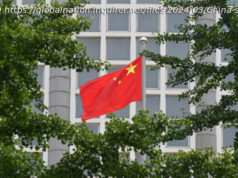The democracy movement may be quiet. But it is alive and it will survive.
As of a couple of weeks ago, Hong Kong no longer has a formal political opposition. The entire pro-democracy camp resigned from Hong Kong’s Legislative Council in protest over a resolution by the Standing Committee of the National People’s Congress in Beijing that legalized the removal of four opposition legislators — a decision Carrie Lam, Hong Kong’s chief executive, had essentially requested. Is that what Mrs. Lam had in mind on Wednesday when in her latest annual policy address, she claimed that she “seeks to restore Hong Kong’s constitutional order”? Or when she reaffirmed a “steadfast determination to implement ‘one country, two systems’” — the governance system that is supposed to protect the city’s semi-autonomy from Beijing — only then to chide that “some people’s awareness of the ‘one country’ principle has yet to be enhanced”? Claudia Mo, one of the LegCo members who resigned recently (and a good friend of mine), said that the disqualifications were an attempt to sound a “death knell” for “Hong Kong’s democracy fight.” She was as defiant as ever, but for many of her colleagues and supporters, the government’s move was downright painful. Yet to say that Hong Kong’s democracy movement is now dead would be only half true. In fact, the movement is only half dead — or only half of it is dead. The other part of it is here for the long haul. Claudia and her comrades are concerned about the survival of the Civic Party, which she co-founded (but later resigned from), and the Democratic Party, the groups at the forefront of Hong Kong’s pro-democracy movement for 20 some years. The first threat they face is the prospect of a direct crackdown: The Civic Party and the Democratic Party could be outlawed and their members arrested, as has happened to smaller, more radical groups over the past several years. The second threat may be more serious still — because it challenges the two parties’ reason for being. The movement those groups represented was a legacy of British times. As the colonial authorities departed the city in 1997, they hoped that Hong Kong could achieve a basic degree of electoral democracy even after its return to China, under the 50-year special arrangement that Beijing had agreed to. The main vehicle for protecting rights and freedoms in the city was to be the Democratic Party, and later the Civic Party. The parties’ leaders — mostly barristers, professors and other elite professionals — often regarded themselves as the loyal opposition: fighting for democracy even while accepting Chinese sovereignty. This legacy movement, commonly known in Hong Kong as the “pan-dem” camp, followed a two-prong strategy.






